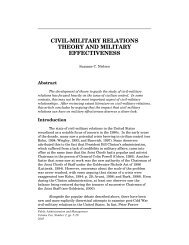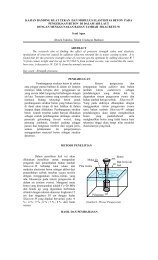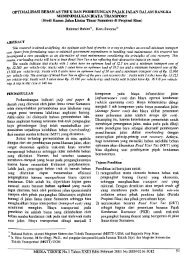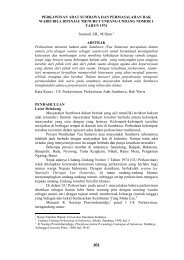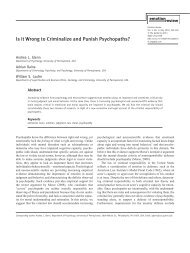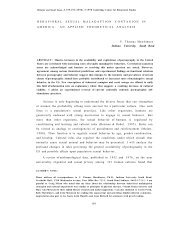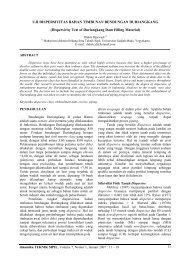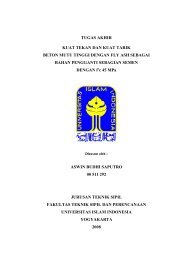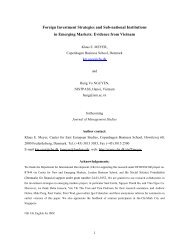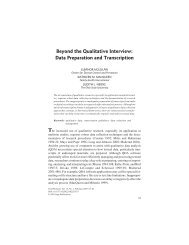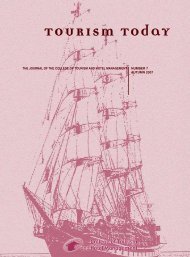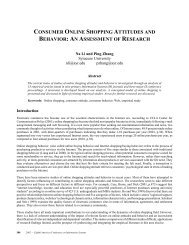The Invisible Black Victim: How American Federalism Perpetuates ...
The Invisible Black Victim: How American Federalism Perpetuates ...
The Invisible Black Victim: How American Federalism Perpetuates ...
Create successful ePaper yourself
Turn your PDF publications into a flip-book with our unique Google optimized e-Paper software.
Hearing of the Public Safety and Public Health and Human Services Committees, 13 Feb.<br />
2006, p. 182).<br />
A representative from the Happy Hollow Advisory Council also noted this connection at the<br />
same hearing:<br />
In working with the children at the [Happy Hollow] recreation center, I see that we are<br />
raising a lot of our children, you know, in the streets. . . . We have been successful in putting<br />
together programs to keep the children off the street. On Thursday and Friday nights we have<br />
games. . . . We have homework help and things like that that we offer also in the evenings,<br />
again to keep the children off the streets and have them in some type of structured activity.<br />
Our young men have sports and other activities. We lack activities for our young girls in life<br />
skills, in mentoring, and other programs that would help them to develop a strong quality of<br />
life and special values (''Blueprint for a Safer Philadelphia,'' Philadelphia City Council, Joint<br />
Hearing of the Public Safety and Public Health and Human Services Committees, 13 Feb.<br />
2006, p. 169).<br />
Testimony from hearings on gun violence linked the use of guns to their wide availability. At<br />
a hearing on gun violence on November 15, 2000, in Philadelphia, a local citizen and member<br />
of a group called Ex-Offenders for Community Empowerment noted:<br />
Ex-Offenders for Community Empowerment uses the life experiences of ex-offenders in<br />
campaigns to reduce the flow of firearms into our communities and to give youth a chance at<br />
a life free of fear . . . it takes opportunity in order for a crime to be committed. By removing<br />
firearms in our communities, we are taking the opportunity away from a crime to happen<br />
(''Public Hearing and Public Meeting Before the Council Committee on Public Safety,''<br />
Council of the City of Philadelphia, 15 Nov. 2000, p. 13).<br />
Similarly, at a 2004 council hearing on two gun control bills, a representative from<br />
Philadelphia Citizens for Children and Youth (PCCY) explicitly suggested that the<br />
availability of guns actually creates criminality. ''It's not just criminals that get the guns. It's<br />
the proliferation of guns in the community that, if someone gets angry, they reach out and<br />
[use a gun] and become criminals'' (''Public Hearing and Public Meeting Before the Council<br />
Committee on Public Safety,'' Council of the City of Philadelphia, 9 March 2004, p. 126).<br />
PCCY, Ex-Offenders, and other groups such as Father's Day Rally are regular participants in<br />
hearings aimed at reducing violent victimization in minority communities.<br />
A second implication of citizen engagement at the local level is that the emphasis on<br />
connections between crime and other conditions reorients local crime politics away from<br />
punishing offenders and toward harm reduction and helping victims. This is one of the most<br />
provocative differences between crime-and-punishment debates at the local level, compared<br />
to those at the national level. While victims' rights groups have gained attention over the past<br />
few decades, the policy outcome associated with their involvement has tended to equate<br />
support for victims with the harsher punishments of offenders (see Zimring et al. 2001).<br />
Thus, high-profile, heinous crimes such as child abductions and murders lead to ''three strikes<br />
you're out,'' and shooting rampages lead to five-year mandatory minimum sentences for gun<br />
offenses in federal court.<br />
At the local level, such connections are more convoluted. <strong>The</strong> passage of numerous bills in<br />
Philadelphia and Pittsburgh in the 1990s and 2000s aimed at regulating guns illustrates this



